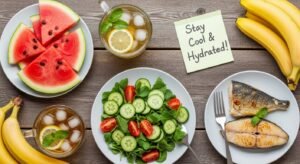1. Why Are Summers Getting Hotter? The Science Behind the Rising Temperatures
Have you noticed how summer seems to arrive earlier and stay longer each year? And the heat feels more intense than ever? You’re not imagining things! Scientists agree that the planet is heating up, and this affects how we experience our seasons—especially summer.
The main reason for this is called global warming. This happens because humans release gases like carbon dioxide (CO₂) and methane (CH₄) when we drive cars, run factories, and use electricity. These gases trap heat in the Earth’s atmosphere, almost like a thick blanket. So, while the sun’s rays come in, the heat struggles to escape back into space. The result? Our planet’s average temperature keeps rising, making heatwaves stronger and more frequent.
Another factor making summers hotter—especially in cities—is something called the urban heat island effect. Think about your neighborhood: lots of buildings, roads, and concrete surfaces that soak up and hold heat longer than natural areas like parks or forests. On top of that, cars and air conditioners release extra heat into the environment. Because of this, city areas can be 2 to 5 degrees warmer than nearby rural spots. This means summer nights in the city can feel especially sticky and uncomfortable.
These changes in our climate and environment aren’t just about discomfort. They can have serious health impacts, especially for seniors. That’s why understanding the science behind the heat is the first step to protecting yourself and your loved ones.
Keep reading to discover easy and effective ways to stay safe and cool this summer!
2. Heatwave Alert! Five Simple Steps to Stay Safe and Cool Right Now
Knowing why the heat is getting worse is important, but the next step is taking action. Don’t ignore the warning signs or think “it won’t happen to me.” Heatwaves can be dangerous, especially for older adults, young children, and people with health conditions.
Here are five easy but powerful steps you can start doing today to protect yourself and those around you:
- Drink water regularly—even if you’re not thirsty. Waiting until you feel thirsty means your body is already dehydrated. Try to sip a glass of water every 30 minutes. Avoid drinks with caffeine or lots of sugar, like coffee or soda, because they can dehydrate you more.
- Avoid the hottest part of the day (usually 12 pm to 5 pm). Plan your outdoor activities for early morning or late evening when the sun isn’t as strong. If you must go outside during peak hours, stay in the shade as much as possible and keep it short.
- Make your home a “cool fortress.” Use blackout curtains or blinds to block sunlight during the day. Run your air conditioner or fans to keep the indoor temperature between 78°F (26°C) and 82°F (28°C). Don’t forget to clean your AC filters regularly to maximize efficiency. When cooking, use a microwave instead of the stove to reduce indoor heat.
- Dress light and bright. Dark clothes absorb more heat, so wear light-colored, loose-fitting clothes made of breathable materials like cotton or linen. Don’t forget a wide-brimmed hat and UV-blocking sunglasses if you go outside.
- Check on vulnerable neighbors and family members. Seniors, young kids, and people with chronic illnesses are more at risk for heat-related problems. Call or visit them regularly to make sure they’re staying cool and hydrated.
For more detailed heat safety tips from the CDC, check this official guide: CDC Extreme Heat Safety Tips.
These simple steps can make a huge difference in keeping you safe during heatwaves. Keep reading for more tips, including what to eat and a handy checklist to prepare for the heat!

3. Heat-Busting Foods: What to Eat to Stay Refreshed and Energized
When the temperature rises, it’s normal to lose appetite and feel tired. But eating the right foods can help your body stay cool and keep your energy up. Here are some easy-to-find, heat-friendly foods perfect for hot days:
- Watermelon: With over 90% water content, watermelon is a natural thirst quencher. It’s also rich in antioxidants like lycopene that help protect your skin from sun damage.
- Cucumber: Cool and crunchy, cucumbers are packed with water and electrolytes like potassium, which help balance your body’s fluids. Add them to salads or enjoy as a refreshing snack.
- Berries: Blueberries, strawberries, and raspberries are full of vitamins and antioxidants that fight inflammation and help your body recover from heat stress.
- Leafy Greens: Spinach, kale, and lettuce have high water content and essential nutrients that support hydration and overall health.
- Yogurt: A great source of probiotics and protein, yogurt cools your body and aids digestion. Try it with fresh fruit or a drizzle of honey.
- Chilled Soups: Gazpacho or cucumber soup are delicious, hydrating, and easy to prepare. They can help you get extra fluids and nutrients without heating up your kitchen.
- Coconut Water: Natural coconut water is packed with electrolytes and is an excellent way to rehydrate after sweating.
- Citrus Fruits: Oranges, lemons, and grapefruits are juicy and refreshing with lots of vitamin C to support your immune system.
- Tomatoes: Juicy and versatile, tomatoes contain antioxidants that may protect your skin and keep you cool.
- Herbal Teas (iced): Peppermint or chamomile iced teas are soothing and can help lower your body temperature naturally.
Eating these foods regularly during hot weather will help keep you hydrated and full of energy. And remember, drinking plenty of water is the key to beating the heat!
Keep scrolling for a complete heatwave preparedness checklist to help you stay safe this summer!
4. Essential Heatwave Checklist: Stay Safe and Cool
Heatwaves can be dangerous, especially for seniors, young children, and people with chronic health conditions. To protect yourself and your loved ones, follow this comprehensive checklist to stay safe during extreme heat:
- Stay Informed: Monitor local weather forecasts and heat alerts. The Australian Bureau of Meteorology provides a Heatwave Service to help you stay updated.
- Prepare Your Home: Ensure air conditioners and fans are working properly. Close blinds or curtains during the day to block out heat and open them at night to allow cooler air in.
- Stay Hydrated: Drink plenty of water throughout the day, even if you don’t feel thirsty. Avoid alcohol and caffeine, as they can dehydrate you.
- Limit Outdoor Activities: Avoid strenuous activities during the hottest parts of the day (usually between 12 PM and 4 PM). If you must go outside, wear light-colored, loose-fitting clothing and a wide-brimmed hat.
- Check on Vulnerable Individuals: Regularly check on elderly family members, neighbors, and others who may be at higher risk during a heatwave.
- Have an Emergency Kit: Prepare a kit with essentials like water, non-perishable food, medications, a flashlight, and a battery-powered fan in case of power outages.
- Seek Cool Spaces: If your home becomes too hot, consider visiting air-conditioned public places like shopping centers, libraries, or community centers.
- Recognize Heat-Related Illnesses: Be aware of symptoms of heat exhaustion (heavy sweating, weakness, dizziness) and heatstroke (high body temperature, confusion, loss of consciousness). Seek medical attention immediately if these occur.
For more detailed information and additional tips, refer to the Australian Red Cross’s guide on preparing for a heatwave: How to Prepare for a Heatwave.
By following this checklist, you can help ensure your safety and well-being during extreme heat events. Stay cool and take care!

5. Top 10 Heatwave-Friendly Foods to Keep You Energized and Hydrated
During hot weather, eating the right foods is key to staying hydrated, maintaining energy, and helping your body cope with heat stress. Here are 10 delicious and easy-to-find foods perfect for heatwaves, especially for seniors:
- Watermelon: Packed with over 90% water and natural electrolytes, watermelon helps you stay hydrated and cool.
- Cucumber: Crisp and refreshing, cucumbers are low in calories and high in water content, perfect for salads or snacks.
- Berries: Blueberries, strawberries, and raspberries are rich in antioxidants and vitamins that support immune health.
- Leafy Greens: Spinach, kale, and lettuce provide essential vitamins and minerals while being light and easy to digest.
- Greek Yogurt: A great source of protein and probiotics, it helps maintain gut health and cools the body when eaten chilled.
- Coconut Water: Natural and rich in potassium, it’s a fantastic drink for rehydration.
- Tomatoes: Contain lycopene and plenty of water; excellent for salads or fresh sauces.
- Chilled Soups: Gazpacho or cucumber soup can be refreshing and nutrient-packed meal options.
- Melons: Cantaloupe and honeydew are sweet, hydrating, and easy on the stomach.
- Nuts and Seeds: Though calorie-dense, small portions of almonds or sunflower seeds provide energy and essential fats.
Including these foods regularly during hot days can boost your hydration and energy levels while keeping meals light and enjoyable. Don’t forget to drink plenty of water alongside your meals!
6. Final Checklist: Are You Ready to Beat the Heat Safely?
After learning all these tips and tricks, it’s time to make sure you’re fully prepared to handle the summer heat like a pro. Let’s do a quick check to see if you’ve covered everything essential to stay cool, safe, and healthy during the hot months.
- Are you drinking water regularly, even if you don’t feel thirsty? Aim for at least 8 cups a day to keep hydrated.
- Have you planned your outdoor activities to avoid the hottest hours between 12 PM and 5 PM?
- Do you use curtains or blinds to block direct sunlight during the day?
- Are you dressing in light-colored, loose-fitting clothes and wearing a wide-brimmed hat and sunglasses when outside?
- Is your air conditioning system well-maintained with clean filters for maximum cooling efficiency?
- Have you checked in on vulnerable family members, friends, or neighbors like seniors and young children?
- Do you know the signs of heat-related illnesses like dizziness, headaches, nausea, or rapid heartbeat?
Remember, heatwaves are not just uncomfortable—they can be dangerous. Being proactive and prepared is your best defense against heat-related health problems. If you notice any symptoms of heat exhaustion or heatstroke, seek medical help immediately.
For more detailed advice on staying safe during heatwaves, visit the official CDC Extreme Heat Safety page. It’s packed with practical tips and resources to keep you and your loved ones protected.
Stay cool, stay safe, and enjoy a healthy summer with WhyNotRelax!
*You Might Also Like –Do Fall Detection Watches Really Work? The 2025 Truth About Senior Safety

